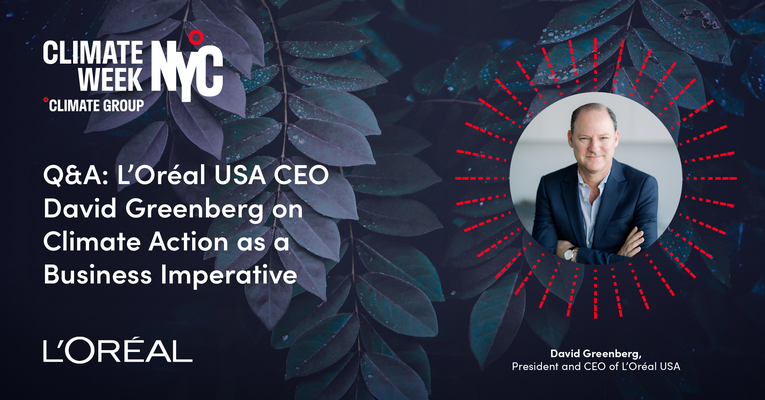We recently sat down with David Greenberg, who was appointed President and CEO of L’Oréal USA in 2022, to talk about climate progress as a business imperative, and localizing ambitious global commitments in the US.
You are now CEO of L’Oréal’s US business, but you have had a long career with the company prior to this moment. How are you thinking about sustainability in your new role?
Yes, I have been a part of L’Oréal for nearly thirty years. And in that time, I have had the good fortune of working closely with stakeholders across all areas of our business – national retailers, suppliers, vendors, small businesses like salons, independent customers like hairdressers, passionate employees, conscious consumers. What is striking to me is how much consensus there is among our partners about the need to create more sustainable business models. The business community is acting together on this. We have all come to a similar conclusion that we have no choice but to adapt our approaches, reduce our impacts and do everything we can to make our businesses more resilient to the natural disruptions that are increasing now in frequency. I think this collective action is powerful. When we speak to our retailer partners now, we are discussing ways to eliminate waste streams, develop consumer recycling programs, reduce the emissions associated to our products and create greater transparency of information regarding the impact of products. As CEO of L’Oréal’s largest subsidiary, I see clearly how climate action is inextricably linked to business performance. It is no longer possible, in any industry, to talk about success based on financial results alone. Success means that we are working together with all of our stakeholders to meet this critical moment, and I am inspired by the pride our employees take in what they have achieved so far as part of our global L’Oréal For the Future commitment.
How is L’Oréal Getting It Done in the US?
Last year, we reached an important milestone when we achieved carbon neutrality for Scopes 1 and 2 emissions across our 25 US-based sites. We reached this milestone through a multi-faceted effort to reduce energy consumption, invest in renewable energy projects at our sites, source local renewable energy credits for our manufacturing plants, our distribution centers, our research labs and our administrative offices spanning 12 states. We are a get-things-done kind of company. Another recent example of this is how we are working, on a very local level, to help enhance recycling infrastructure across America. Up to 40 million homes in small communities don’t have adequate access to recycling programs. This is a challenge for L’Oréal, as we have ambitious goals for the recyclability of our packaging. Through our work with the Recycling Partnership, we were able to launch the Small Town Access Fund, announced this week. Created with founding support from L’Oréal USA, with GlobalGiving and Maybelline New York, the Fund provides access to recycling for communities across the country with populations of less than 50,000 and is launching in nine states in its first year.
How else are you involving L’Oréal consumers in this work, and why is it important?
Our climate efforts will only succeed if we involve our 1.5 billion global consumers, hundreds of millions of whom live in the US. And this is crucial, because, on average, 50% of our cosmetics products’ carbon footprint is related to the use phase. There is an urgency for us to educate consumers and use our influence to shift consumer behavior. And there is an opportunity for us to provide greater transparency that empowers our consumers make informed, sustainable product choices. One way we’re doing this is through our Product Impact Labelling system, which scores L’Oréal products with a letter grade from A to E, accounting for 14 planetary impact factors at every stage of a product’s life cycle. This launched in the US in June, initially through our Garnier brand’s haircare products, and will continue to expand in the coming months. We’re also actively collaborating with our industry peers as a founding member of the EcoBeautyScore Consortium, which is working toward an industry-wide environmental impact assessment and scoring system for cosmetics products.
As you look to the future, how will sustainability continue to play a role in L’Oréal’s overall strategy?
I think it’s about redefining what “good business” really means. Sustainability is not sequestered to one part of our work as a company. It is central to what we do, and I think that is representative of this critical moment we find ourselves in. We have a responsibility that is equal to our scale when it comes to creating solutions to the crises we are facing as a global community. As we continue to reach our goals, we are setting and working toward new and more ambitious ones. This work continues to build upon itself, and we’re committed to pursuing new solutions in a tireless way. This is the nature of Getting It Done, and we are proud to, once again, be a sponsor of Climate Week NYC.
